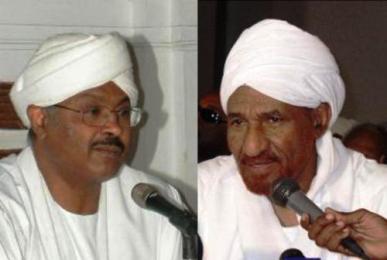Sudanese opposition figure denies leading a dissidence in the Umma party
August 27, 2012 (LONDON) — Mubarak Al-Fadil Al-Mahdi, a leading figure in the National Umma Party (NUP), has dismissed accusations that he is leading an attempt to divide the party and insisted that what is taking place is a disagreement over the political line of the main opposition force.

Al-Mahdi nonetheless said he rejected a demand to expel Mubarak from the party but proposed referring his case to an accountability body to decide on his membership.
In an interview with Sudan Tribune, Mubarak minimized these accusations saying the ongoing political struggle in the party is more related to a generational conflict and the position of the youth base against any rapprochement with the ruling National Congress Party (NCP).
“What is taking place in the party is a generational conflict between a youth movement seeking to emancipate itself from a patriarchal leadership which is used to decide unilaterally on all the political issues,” he said.
He also expressed regret at the accusation leveled by the NUP leader that he is implementing a foreign scheme adding that such simple allegations are often used to undermine the credibility of others and deflect attention away from other issues.
Mubarak said the latest dispute is linked to last April’s election of a new secretary general, Ibrahim Al-Amin, who challenged the incumbent secretary general Sideeg Ismail who is widely believed to have been al-Mahdi’s favourite .
Al-Mahdi’s support of Ismail raised eyebrows given the former SG’s alleged strong links with the ruling National Congress Party (NCP).
The removal of Ismail strengthened the anti-NCP faction inside the party which is supportive of a popular uprising in Sudan as opposed to al-Mahdi’s call of a “soft landing” and his opposition to a forceful removal of the NCP-dominated regime.
Mubarak said the idea of peaceful political change as supported by al-Mahdi “is not in the books of the ruling party”. He further went on to say that the NCP would only implement such an agenda if put under pressure.
“How we can hold a constitutional [a] conference without the participation of the ruling party? In such case this conference will be simply a political workshop without effect,” he said.
Mubarak was alluding to the political conference for democratic transition the NUP said it is intending to hold with the participation of all political forces. However, the NCP swiftly rejected the initiative saying there is no need in the country for such a summit as there is a legitimate stable government.
Al-Mahdi is under growing pressure from the party’s base over what is described as his vague position with regard to the regime which came to power and ousted him from the position Prime Minister through a coup more than two decades ago.
Late last year, al-Mahdi’s eldest son Abdel-Rahman was appointed as assistant to Sudanese president Omer Hassan al-Bashir which further deepened skepticism towards the NUP leader and his stance with regards to the ruling party.
Al-Mahdi has refused to back a series of anti-NCP demonstrations that broke out in Sudan during the summer to protest against the cost of living and warned that ousting the regime by force will break the country apart.
(ST)
